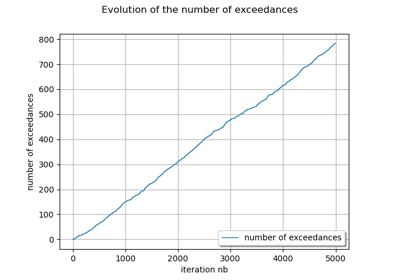IterativeThresholdExceedance¶
- class IterativeThresholdExceedance(*args)¶
Iterative threshold exceedance.
- Parameters:
- dimensionint, optional
Dimension of the input data, default is 1
- operator
ComparisonOperator, optional Comparison operator, default is
Greater- thresholdfloat, optional
Threshold value, default is 0.0
See also
Notes
This class iteratively counts the number of threshold exceedances of an iteratively increasing dataset without storing any data in memory.
Examples
>>> import openturns as ot >>> ot.RandomGenerator.SetSeed(0) >>> dim = 5 >>> threshold = 0.5 >>> algo = ot.IterativeThresholdExceedance(dim, ot.Greater(), threshold) >>> n = ot.Normal(dim) >>> size = 50
Increment with 50 points:
>>> for i in range(size): ... point = n.getRealization() ... algo.increment(point) >>> print(algo.getThresholdExceedance()) [14,14,14,17,12] >>> print(algo.getIterationNumber()) 50
Increment with one sample of size 50:
>>> sample = n.getSample(size) >>> algo.increment(sample) >>> print(algo.getIterationNumber()) 100 >>> print(algo.getThresholdExceedance()) [38,30,35,27,32]
Methods
Accessor to the object's name.
Get the dimension of the algorithm
Get the current iteration of the algorithm
getName()Accessor to the object's name.
getRatio()Returns the ratio of threshold exceedances per iteration
Returns the number of threshold exceedances per component
Returns the value of the threshold
hasName()Test if the object is named.
increment(*args)Increment the internal data.
setName(name)Accessor to the object's name.
- __init__(*args)¶
- getClassName()¶
Accessor to the object’s name.
- Returns:
- class_namestr
The object class name (object.__class__.__name__).
- getDimension()¶
Get the dimension of the algorithm
- Returns:
- dimensionint
Dimension of the algorithm
- getIterationNumber()¶
Get the current iteration of the algorithm
- Returns:
- iterationint
Current iteration of the algorithm
- getName()¶
Accessor to the object’s name.
- Returns:
- namestr
The name of the object.
- getRatio()¶
Returns the ratio of threshold exceedances per iteration
- Returns:
- ratio
Point Ratio of threshold exceedances per iteration, per component.
- ratio
- getThresholdExceedance()¶
Returns the number of threshold exceedances per component
- Returns:
- thresholdExceedance
Point Number of threshold exceedances per component.
- thresholdExceedance
- getThresholdValue()¶
Returns the value of the threshold
- Returns:
- thresholdValuefloat
the value of the threshold.
- hasName()¶
Test if the object is named.
- Returns:
- hasNamebool
True if the name is not empty.
- increment(*args)¶
Increment the internal data.
- Parameters:
- datasequence of float or 2-d sequence of float
New input point or sample.
- setName(name)¶
Accessor to the object’s name.
- Parameters:
- namestr
The name of the object.
 OpenTURNS
OpenTURNS
